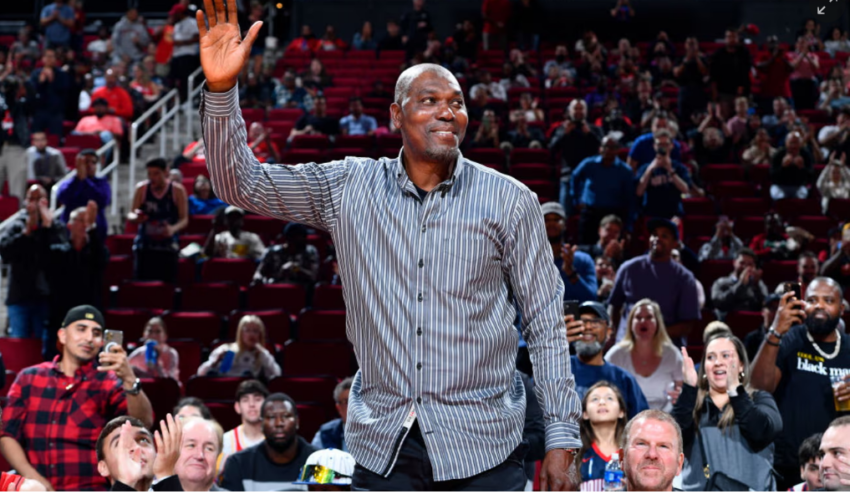Last weekend in San Antonio and Tampa, two very different scenarios, a dramatic upset and a long-awaited title, played out. The women’s basketball team at UConn won their first national championship in nearly a decade, and the men’s basketball team at Houston staged a stunning comeback victory over Duke in the Final Four. Both teams were well supported by alumni, including former Huskies Breanna Stewart, Diana Taurasi, Maya Moore, and Sue Bird. Taurasi and Bird were on broadcast duties, but Moore and Stewart were in the stands during UConn’s victory and breezed onto the court to celebrate the win. Hakeem Olajuwon, who went on to play Hall of Fame NBA basketball and played college basketball at Houston, was in town to support the Cougars. However, Olajuwon was not permitted to join his former college in celebrating their court victory over Duke, unlike the former Huskies. The question of who is to blame—the security guard who stopped Olajuwon or the Cougars themselves—has been heatedly debated in light of the moment’s video. The fact that Olajuwon is Black and the security guard is white in the video raises questions for some, while for others, the whole mess could have been avoided if the team had made it clear that Olajuwon was welcome on the court. After all, why couldn’t Olajuwon join their former team in celebrating? Moore and Stewart were there. Since then, he has stated that the incident was caused by a mix-up rather than malicious intent by the Cougars or the security guard. Nevertheless, the debate around the two incidents raises an interesting question. How much does a college owe its star players after they graduate?
—-
During the week of the Sweet Sixteen, a WNBA champion contacted me to ask for help getting into games for her former team. For an athlete of that caliber, this was a surprising request. I had assumed that universities that had benefited from an athlete’s talent would invite them to essential games to repay the favor. Alexis Hornbuckle, who won two NCAA championships under Pat Summitt at Tennessee, knows about the sometimes confusing and isolating path traveled after an athlete’s playing days are behind them.
She quickly explained during our conversation last week that she does not necessarily believe that athletic directors and coaches are responsible for maintaining players’ relationships with their former teams. However, she also mentioned that the efforts of Coach Summitt assisted her in developing relationships with Tennessee women’s basketball players from the 1970s. “Coach Summitt was all about the sisterhood,” Hornbuckle said, “and I know [former Tennessee football] Coach Phillip Fulmer was all about the brotherhood. There have been coaching and athletic trainer changes since I graduated from Tennessee in 2008, so it must be different, right? People and names will inevitably be forgotten. It’s not the job of the coaches and the athletic directors to take care of former players necessarily because their focus has to be their current players.”
That’s right; however, that doesn’t mean schools can’t try. Sadly, the problem goes a little deeper for some players. According to an unidentified former NCAA champion, money, that perpetual game-changer, can influence who is invited to major events like championship games. She stated, “Sometimes, it’s maybe that person made it to the next level and their name is bigger,” but “sometimes it’s that they donated X amount of money to the university.” The university will make sure they get tickets to a game if they want to go. Regardless of the sport, they will be introduced or recognized on the jumbotron as they leave the court or field. Nevertheless, they only select a few. It is understandable that athletic departments also take money into account. It’s one thing to invite a few players from one team to a big event; it’s quite another to expect a university to let hundreds or even thousands of former athletes who want to go to those events in their way. One solution could be a kind of first come, first serve system wherein programs disperse a certain number of tickets; another might be for former athletes to design their support systems.
—-
If universities don’t have the resources to support former stars – or want to – maybe it’s time those players support themselves.
Two Tennessee graduates are doing just that. VOLegacy is a player-led organization founded by two former football players but is open to anyone who represents the college. The group hosts local meet-ups and helps former players attend games together, whether that’s through accreditations or financial assistance for tickets.
While South Carolina has an alumni center, it stated that “we do not have tickets to athletic events that specifically cater to alumni athletes.” Tennessee appears to be a rare exception: Baylor and UConn both disbanded organizations that were similar to it years ago. Hornbuckle is a proud VOLegacy member. According to her, the organization not only connects athletes with business and mentorship opportunities as well as financial literacy classes, but it also provides “access and information about what’s going on with Tennessee sports and with the university.” According to Hornbuckle, “The goal is really to help athletes navigate that space after you leave college.” “However we can help, we want to be there for each other because what we say is the Tennessee way, right – it’s a family.”
When schools forget, players remember. And some of them are taking the job of building a legacy into their own hands.
This article did not receive responses from the athletic departments of UConn, South Carolina, Baylor, Notre Dame, Tennessee, or South Carolina.
